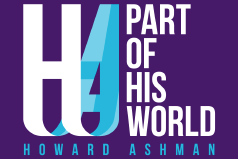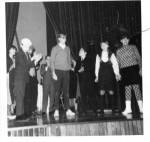In His Own Words
This piece was written for Playbill by Howard shortly after Little Shop hit the big time at the Orpheum, probably around 1983.
A Musical About A Man-Eating Plant?
“All I can say is it’s a good thing you’ve got your own theatre. Don’t get me wrong, I think it’s great. Love the songs, love the script. But a musical about a man-eating plant? Producers are going to laugh me right out of their offices.” That’s what my agent said, and as usual, I’m sure she was right. A commercial producer probably would have done just that and who could blame him?
Fortunately, though, lurking in the bowels of this metropolis are producers of another sort. They don’t really look like producers, these guys. When they visit the midtown offices of their commercial counterparts, they’re often mistaken for messengers. I’m talking about the Barons of Off-Off Broadway, and at the point at which my agent made the above remarks, I was one of them.
My title? Artistic Director.
My theatre? The W.P.A. (Folklore has it the initials stand for, “We’ll Produce Anything.”)
My show? Little Shop of Horrors.
It opened at the WPA in the spring of 1982 and as of this writing, it’s been running over a year at the Orpheum Theatre on Second Avenue, over eight months at the Westwood Playhouse in LA, several weeks at the Comedy Theatre in London’s West End, and I just got back from Stavanger, Norway, where they call it Terrorsjappa and sing it in a very strange and guttural language. You see, once the show became an Off-Off Broadway success, we weren’t so shy about asking commercial producers to climb aboard.
So if it wasn’t such a bad idea, this musical about a bloodthirsty vegetable, why didn’t I thing of it sooner? The answer is I did. In fact, I’d been thinking about Little Shop in one way or another since I first saw the Roger Corman film on which it’s based. It was way past my bedtime on a school night and the beat-up black and white TV was working overtime in my teenaged den of iniquity, the pine-paneled clubroom of our split-level home in Baltimore. The plant monster, Audrey Junior, made a deep and lasting impression. ‘Feed me, Krelborn, Feed me now!’ The words were never to leave my adolescent consciousness. Here, at last, was a monster I could quote! I mean, can you remember any of Godzilla’s snappy one-liners?
And what on earth made me think a musical comedy lay smoldering in the breast of such material? Who knows? But the thought must have occurred more or less immediately. I used to write a lot of musicals in those days, between the ages of twelve and sixteen. (I took some time off between seventeen and twenty-three, but that’s another story and no one’s asked me about it). I’d make a musical out of anything that moved. To Kill a Mockingbird, faithfully adapted from the Reader’s Digest condensed version (the only one with which I was familiar). The life of Charlie Chaplin (he had lots of wives, and even then I knew that was pretty juicy stuff). And an “original” piece, call The Candy Shop in which a man fell in love with an evil talking plant.
Yes, I Was A Teenaged Plagiarist.
Thank goodness and fear of jail, I got over it. In fact, my current musical version of Little Shop, though legitimately (and legally) based on the Corman film, in some ways bears little resemblance to its source. For instance, after beating my rhyming dictionary to a pulp, insisting it come up with an accurate rhyme for ‘junior,’ I finally gave up and changed the monster’s name to Audrey Two. And the plot is pretty different, too. In the film, all the plant’s victims are walk-on actors who were obviously told to show up on the set and die as quickly as possible. In the musical, I make all the actors sing and dance a lot before I allow them to become plant food. After all, they earn union minimum and even Off-Off Broadway producers insist on their money’s worth.
I believe I’ve just covered the most frequently-asked questions about Little Shop.
Why on earth did you write it?
How on earth did you get it produced?
And how closely does it resemble the film?
The last question is usually, “are you writing anything else?” And the answer is a resounding, “of course.”
Little Shop has proven to me that there is a large public demand for musicals about leafy greens and I am consequently at work on a very exciting new project. This one will be more elegant, though. More continental, more sophisticated. More Noel Coward. You see, there’s this very large head of Belgian endive…
Howard Ashman


